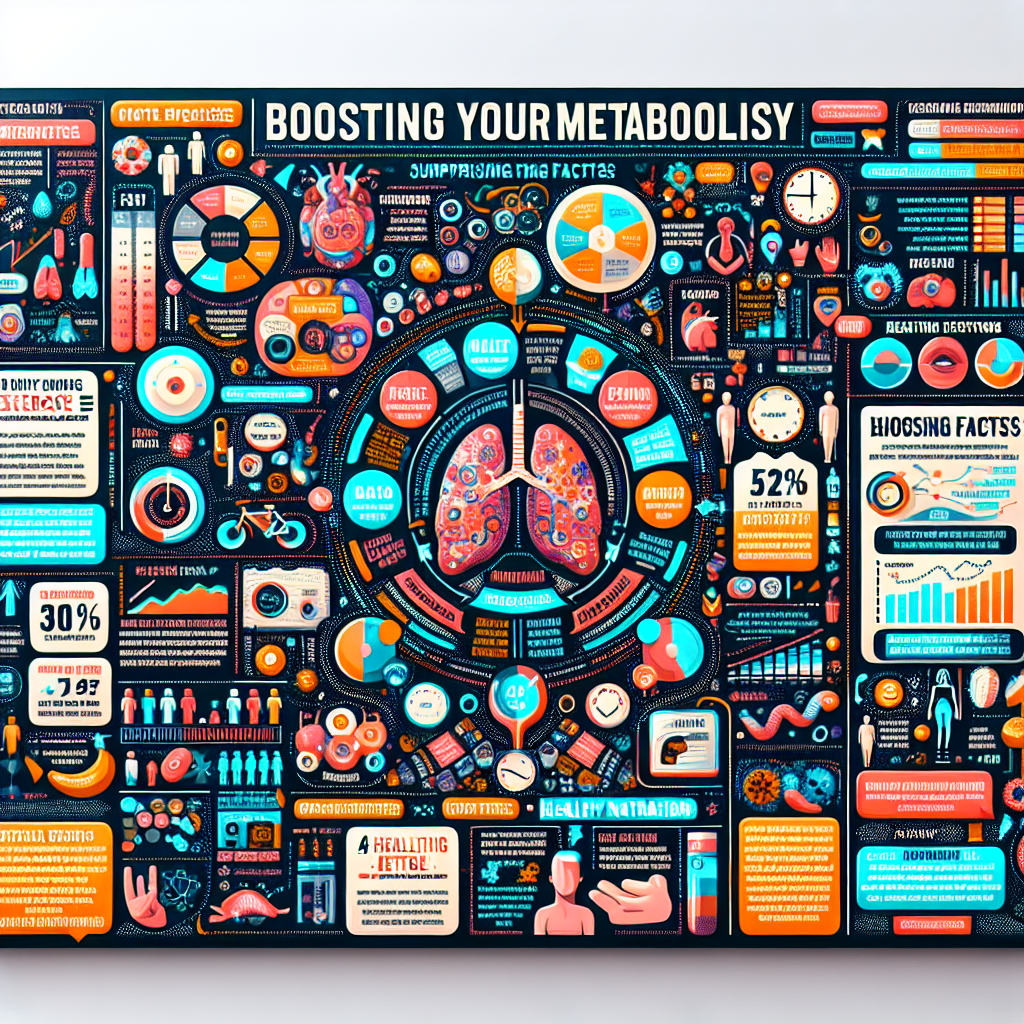Surprising Facts About Boosting Your Metabolism

Discover surprising facts about boosting your metabolism! Uncover the secrets to a healthier, more energetic you. Don’t wait, learn more now! Click here to start your journey towards vibrant vitality.
Unveiling the Unexpected: 10 Surprising Facts About Boosting Your Metabolism
Boosting your metabolism is often touted as the secret to weight loss and maintaining a healthy body. However, the science behind metabolism is more complex and fascinating than most people realize. Here are ten surprising facts about boosting your metabolism that may change the way you think about this vital bodily function.
Firstly, it’s important to understand that metabolism isn’t just about burning calories. It’s a complex process that involves numerous chemical reactions in the body to convert food into energy, build new proteins and cells, and dispose of waste. This process is ongoing, even when you’re at rest, which is why your body continues to burn calories even when you’re not exercising.
Secondly, contrary to popular belief, skipping meals doesn’t boost your metabolism. In fact, it can have the opposite effect. When you skip meals, your body goes into ‘starvation mode’, slowing down your metabolism to conserve energy. This can lead to weight gain over time, as your body becomes more efficient at storing fat.
Thirdly, while it’s true that muscle burns more calories than fat, the difference isn’t as significant as you might think. A pound of muscle burns approximately six calories a day at rest, while a pound of fat burns about two calories. While this difference can add up over time, it’s not enough to significantly boost your metabolism on its own.
Fourthly, genetics play a significant role in determining your metabolic rate. Some people are born with a faster metabolism than others, which can make it easier for them to maintain a healthy weight. However, this doesn’t mean that you’re doomed to a slow metabolism if you’re not genetically blessed. Lifestyle factors like diet and exercise can also have a significant impact on your metabolic rate.
Fifthly, drinking water can temporarily boost your metabolism. Studies have shown that drinking 500ml of water can increase your metabolic rate by up to 30% for about an hour. This effect is even more pronounced if the water is cold, as your body uses energy to heat it to body temperature.
Sixthly, eating protein-rich foods can also give your metabolism a temporary boost. This is because your body uses more energy to digest protein than it does to digest fats or carbohydrates, a phenomenon known as the thermic effect of food.
Seventhly, contrary to popular belief, there’s no scientific evidence to support the idea that eating small, frequent meals boosts your metabolism. While this eating pattern may help control hunger and blood sugar levels, it doesn’t appear to have a significant impact on metabolic rate.
Eighthly, caffeine can boost your metabolism, but only temporarily. While caffeine can increase your metabolic rate by up to 11%, this effect is likely to diminish with regular use as your body becomes tolerant to caffeine.
Ninthly, lack of sleep can slow down your metabolism. Studies have shown that sleep deprivation can decrease your metabolic rate and increase your appetite, leading to weight gain.
Lastly, stress can also negatively impact your metabolism. Chronic stress can lead to hormonal imbalances that slow down your metabolism and promote fat storage. Therefore, managing stress is crucial for maintaining a healthy metabolic rate.
In conclusion, boosting your metabolism is not just about burning calories or losing weight. It’s a complex process that involves numerous factors, from genetics to lifestyle habits. By understanding these surprising facts about metabolism, you can make more informed decisions about your health and wellbeing.
The Hidden Truth: Surprising Facts About Metabolism Enhancement You Never Knew

The human body is a complex machine, and one of its most vital functions is metabolism – the process by which it converts food into energy. It’s a common belief that a fast metabolism is a key to maintaining a healthy weight. However, the truth about metabolism and how to boost it is often shrouded in myths and misconceptions. This article aims to shed light on some surprising facts about metabolism enhancement that you may not be aware of.
Firstly, it’s important to understand that everyone’s metabolic rate is different. It’s influenced by several factors including age, gender, muscle mass, and genetic makeup. Contrary to popular belief, a slow metabolism is rarely the cause of excess weight gain. In fact, the body’s metabolism is inherently efficient, and even when at rest, it’s busy burning calories to keep your heart beating, your lungs breathing, and your other organs functioning.
One surprising fact about metabolism is that while exercise is beneficial for overall health, it doesn’t significantly boost your metabolism as commonly believed. While it’s true that physical activity does increase metabolic rate, the effect is temporary and returns to the baseline once the activity ceases. However, regular exercise does contribute to building muscle mass, which in turn, burns more calories than fat, even when you’re at rest.
Another surprising fact is that crash diets can actually slow down your metabolism. When you drastically cut calories, your body goes into survival mode, slowing down the metabolic rate to conserve energy. This is why such diets often result in a weight loss plateau or even weight gain once normal eating resumes. A healthier approach is to eat balanced meals with adequate protein, as protein-rich foods require more energy to digest, thereby slightly boosting your metabolism.
It’s also worth noting that while caffeine can temporarily increase your metabolic rate, it’s not a long-term solution for weight loss or metabolism enhancement. Over time, your body can become tolerant to the effects of caffeine, diminishing its impact on your metabolism. Moreover, excessive caffeine intake can lead to other health issues like insomnia and increased heart rate.
Hydration is another key factor in metabolism. Water is essential for all metabolic processes in the body. A study published in The Journal of Clinical Endocrinology and Metabolism found that drinking 500ml of water increased metabolic rate by 30% in both men and women. This effect began 10 minutes after water consumption and reached a maximum after 30-40 minutes.
Lastly, getting enough sleep is crucial for a healthy metabolism. Lack of sleep can disrupt the hormones that regulate hunger and appetite, leading to increased calorie intake and potential weight gain. Moreover, sleep deprivation can decrease the number of calories your body burns at rest, further slowing down your metabolism.
In conclusion, boosting your metabolism is not about quick fixes or magic solutions. It’s about maintaining a balanced diet, staying hydrated, getting regular exercise, and ensuring adequate sleep. Understanding these surprising facts about metabolism can help you make informed decisions about your health and wellness. Remember, it’s not about having a fast or slow metabolism, but a healthy one.
Beyond the Basics: Surprising Insights into Metabolism Boosting Techniques
Boosting your metabolism is often touted as the secret to weight loss and increased energy. However, the science behind metabolism is far more complex than simply eating certain foods or doing specific exercises. In fact, there are several surprising facts about boosting your metabolism that go beyond the basics.
Firstly, it’s important to understand that metabolism is not a single process, but rather a series of chemical reactions that occur in the body to convert food into energy. This energy is then used to fuel everything from breathing to thinking to physical activity. The rate at which these reactions occur, known as your metabolic rate, can vary greatly from person to person and is influenced by a variety of factors including age, gender, body composition, and genetics.
One surprising fact about metabolism is that it’s not just about burning calories. While it’s true that a higher metabolic rate can lead to increased calorie burn, this is only part of the story. Metabolism also plays a crucial role in nutrient absorption and distribution, hormone regulation, and immune function. Therefore, boosting your metabolism is not just about losing weight, but also about improving overall health and wellbeing.
Another surprising fact is that while exercise is often associated with boosting metabolism, not all forms of exercise are created equal in this regard. High-intensity interval training (HIIT), for example, has been shown to significantly increase metabolic rate more than steady-state cardio. This is because HIIT creates a metabolic disturbance that requires the body to work harder to return to its resting state, burning more calories in the process.
Moreover, strength training is another effective way to boost metabolism. This is because muscle is more metabolically active than fat, meaning it burns more calories at rest. Therefore, by increasing muscle mass through strength training, you can effectively increase your resting metabolic rate.
Diet also plays a crucial role in metabolism. Contrary to popular belief, starving yourself or drastically cutting calories can actually slow down your metabolism. This is because the body goes into survival mode, slowing down metabolic processes to conserve energy. Instead, eating regular, balanced meals can help keep your metabolism functioning optimally.
Interestingly, certain foods have been shown to have a thermogenic effect, meaning they can temporarily boost metabolism. These include foods rich in protein, such as lean meats and dairy, as well as spicy foods and green tea. However, the effect is relatively small and should not be relied upon as a primary method of boosting metabolism.
Sleep is another often overlooked factor in metabolism. Lack of sleep can disrupt the body’s metabolic processes, leading to decreased calorie burn and increased fat storage. Therefore, getting adequate sleep is crucial for maintaining a healthy metabolism.
Lastly, it’s important to note that while there are many ways to boost metabolism, there is no one-size-fits-all approach. What works for one person may not work for another, and it’s important to listen to your body and find a balance that works for you.
In conclusion, boosting your metabolism goes beyond simply burning calories. It involves a complex interplay of factors including exercise, diet, sleep, and more. By understanding these surprising facts about metabolism, you can take a more informed approach to improving your metabolic health.